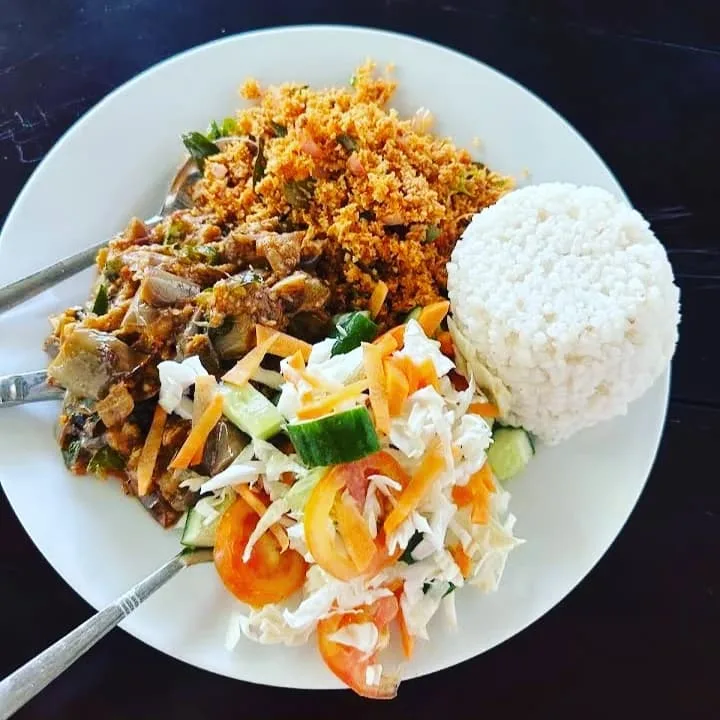We may receive a commission if you make purchases through affiliate links (at no extra cost to you). Read why our approach to travel is different.
If you’ve ever spent more than five minutes in Israel, you’ll quickly understand that food is a big deal here. And no, I’m not just talking about Tel Aviv’s mind-blowing breakfast cafés or Jerusalem’s hidden farm-to-table cafes. In my opinion, the best food in Israel is found in the stalls of vibrant food markets and charismatic street traders.
I’m talking about the bites which comes in paper bags, plastic plates, or wrapped in piping-hot pita. The foods which leave your fingers a little sticky and your t-shirt stained with tahini and amba.
Much like everything in this country, Israeli street food isn’t simply something delicious to eat. It’s the story of a nation wrapped into a meal. Each dish on this list fuses together long histories, nostalgia, difficult politics and stories of migration.
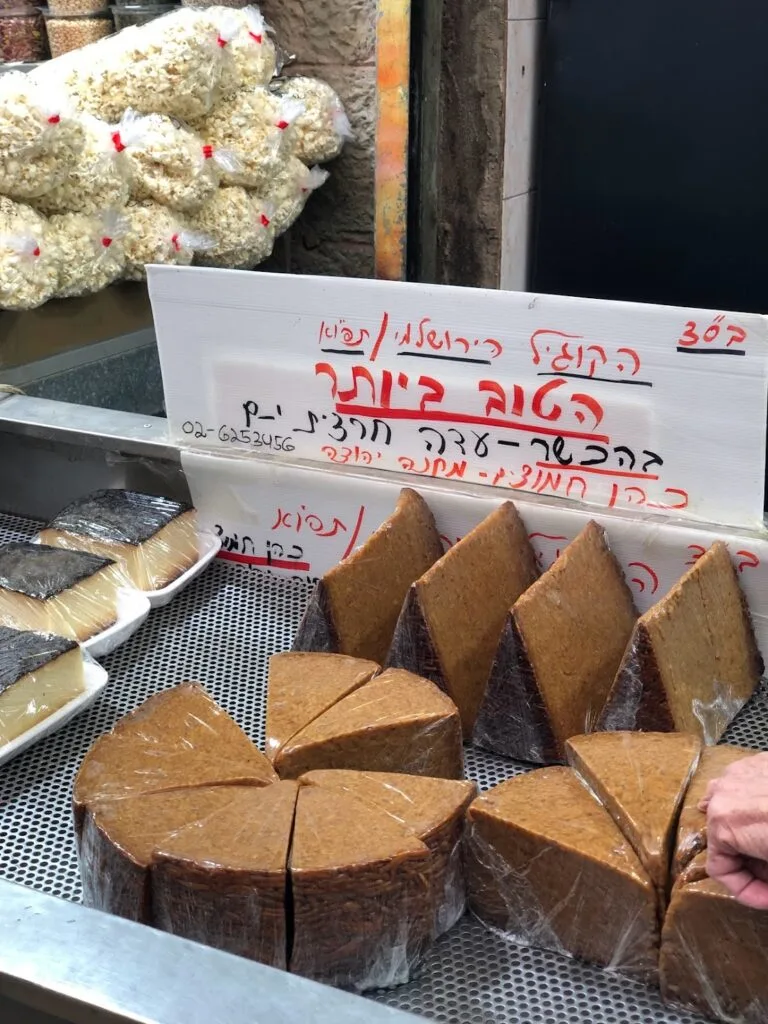
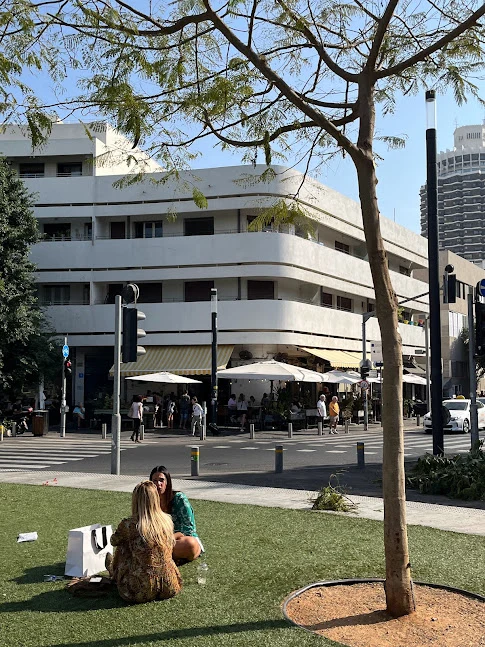
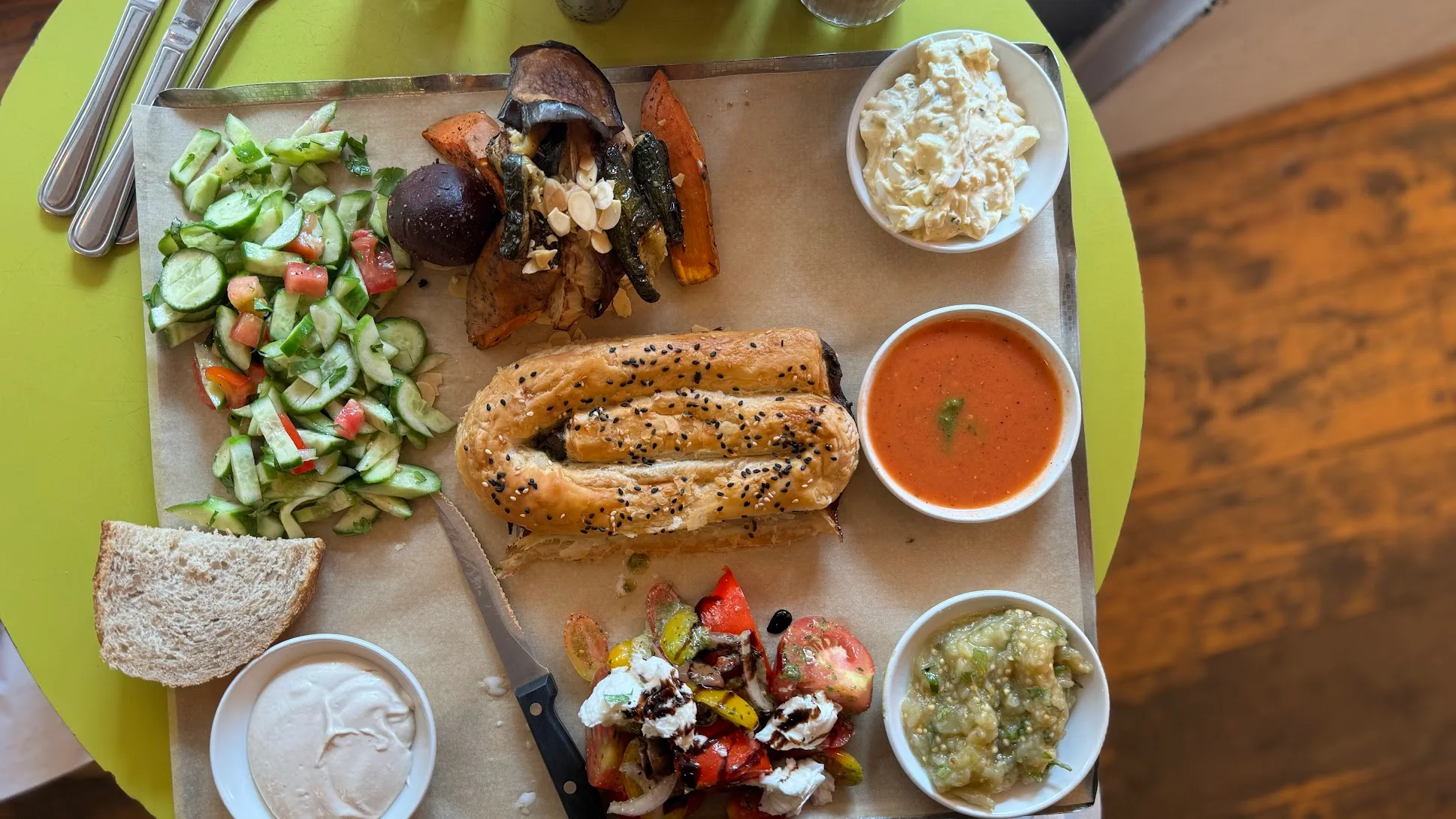
Many of the Israeli street food dishes on this list were literally brought to Israel on the backs of Jews escaping the Middle East, North Africa, Europe and the Caucasus. Flavors which merged the cuisines of host countries with the particular requirements of the Jewish diet. But the story doesn’t stop there. Recipes passed down for generations in diaspora communities were quickly synthesised upon arrival in Israel. In turn, diverse palates from Yemen to Poland to Ethiopia came together to create one of the most unique cuisines in the world.
With that, here are 13 Israeli street foods you absolutely must try when visiting Israel. I’ll also share the best places to try these Israeli street foods across the country.
Skip to...
1. Shawarma
Let’s start with the heavyweight champion of Levantine street food. Shawarma is probably one of the most beloved, most eaten street food dishes in the country.
I’m not going to lean into the politics of food in the region (trust me, its best to stay out of it). But having spent much of my life across the Middle East, I can tell you: Israeli shwarma is very different from neighboring countries and communities.
Israeli shwarma is typically made from turkey or lamb (sometimes both). The meats are slowly roasted on a vertical spit, carved off in sizzling pieces. You’ll usually have the choice of pita, laffa (thicker, chewier bread) or a plate.
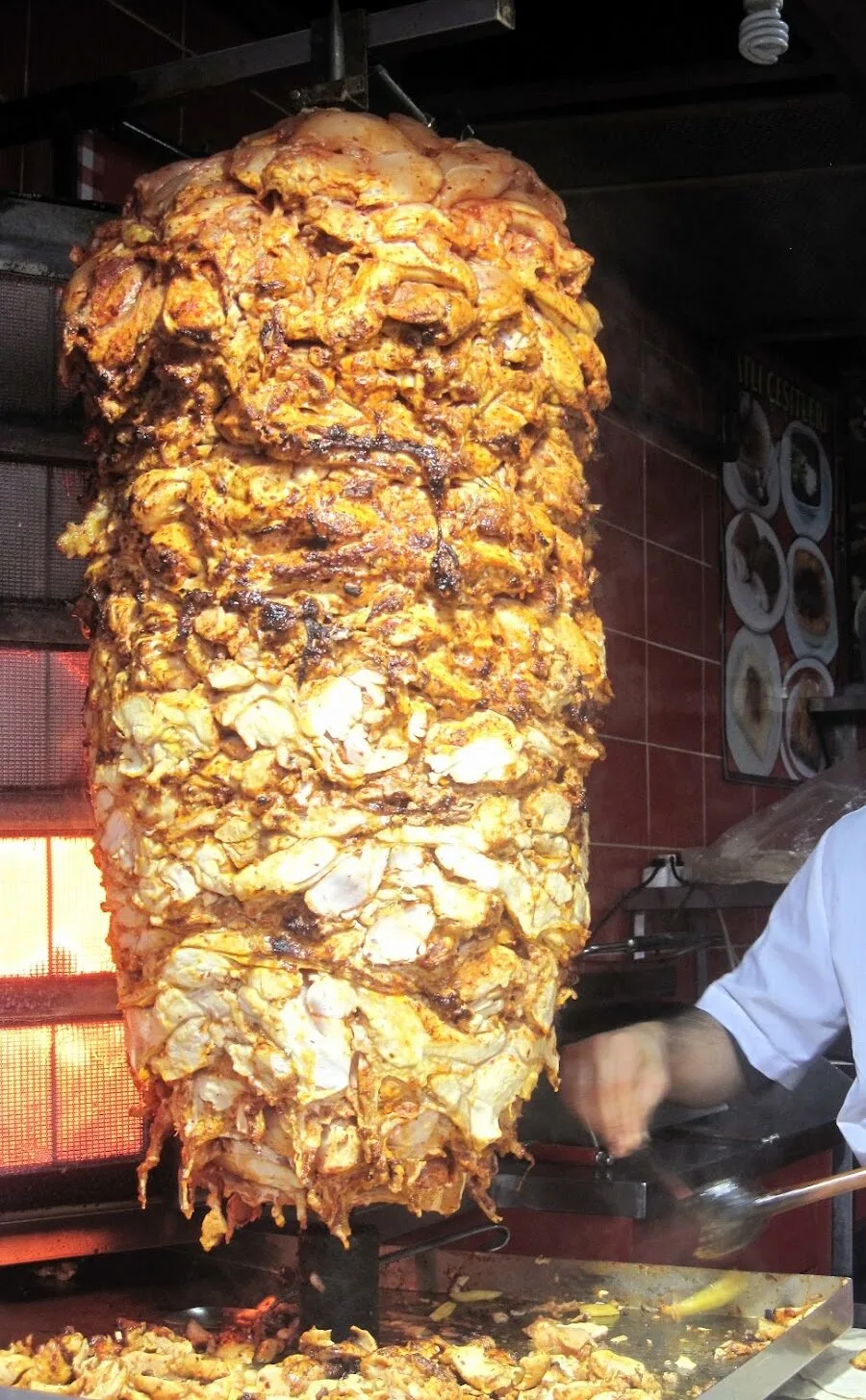
The uniqueness of Israeli shawarma usually comes from the toppings. Unlike neighboring countries with the white tum garlic sauce, Israeli shawarma begins with a heavy slab of hummus and tahini. You’ll then usually have amba (a tangy mango pickle sauce of Iraqi origin), cabbage salad, chopped cucumbers and tomatoes, fried eggplant, and French fries inside the shawarma.
Best place to try shawarma in Israel
Jerusalem
Both Maoz and Moshiko offer quintessential, institutional hole-in-the-wall shawarma experiences. For something a little bougier, the fish shawarma at Dwiny Pita Bar (near Mahane Yehuda Market) is one of my favorite bites in the country.
Tel Aviv
HaKosem (‘The Magician’) is a long-standing Tel Aviv institution, for both falafel and shawarma. In recent years, Yashka has seen an almost permanent line out the door and is often cited as one of the best shawarmas in town.
If you’re planning your own Carmel Market DIY food tour, Mifgash Rambam offers an immaculate veal and lamb shawarma combo.
2. Falafel
It’s hard to walk more than a few metres in Israel without bumping into a falafel joint. Similar to neighboring Jordan and Lebanon, Israeli falafel consists of chickpeas and spices, deep-fried until crisp and tender.
Local tip: Smile at your local falafel men, so hopefully he gives you a falafel ball to taste while you wait.
Is falafel originally Egyptian? Probably. Has it been adopted by much of the entire Middle East? Unquestionably. But what I’ve found is that falafel takes on a different shape depending where you eat it. In Egypt, its made from fava beans and called ta’amiya. In Iraq, its flatter, with a little hole in the middle (and a milder flavour). And, unsurprisingly, in Israel, its a little different too.
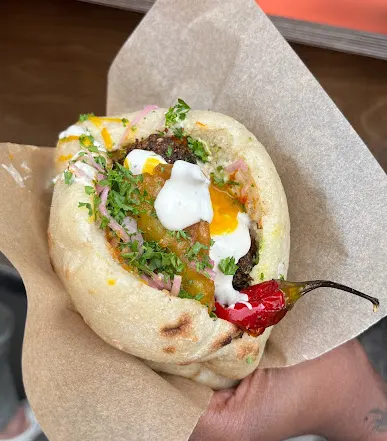
Unlike in neighboring countries, falafel in Israel is almost exclusively a street food (you generally don’t see it on restaurant menus). For most Israelis, falafel is only stuffed into pita and layered with a buffet of toppings.
Best place to try falafel in Israel
Jerusalem
Once again, Maoz and Moshiko are strong contenders in the hole-in-the-wall department. I’m also a big fan of the old-school Shalom Falafel.
If you want to compare Israeli and Palestinian falafel, make your way to Abu Shukri and Arafat Hummus in the Old City, mainstays of the Palestinian falafel scene in Jerusalem.
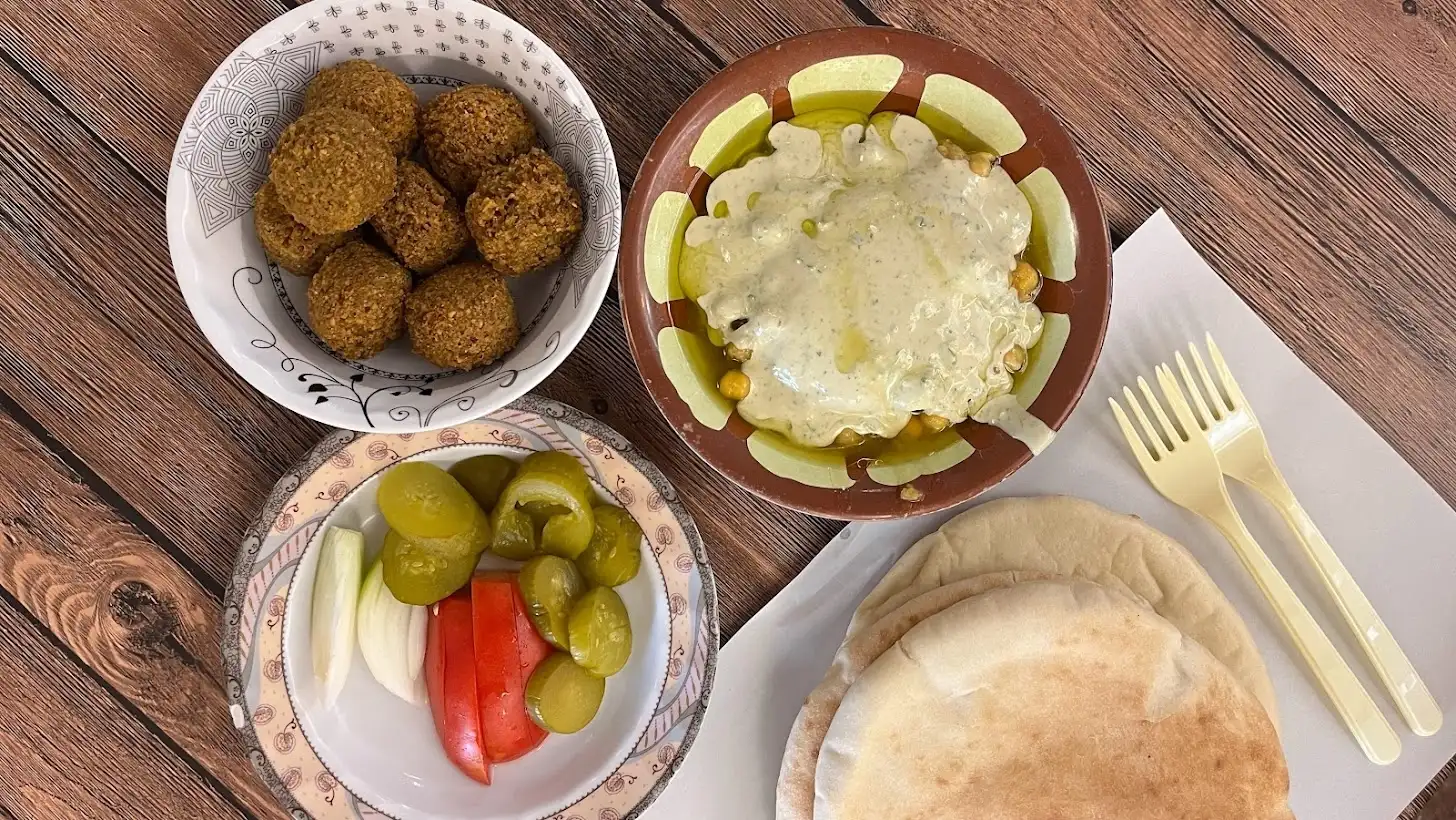
Tel Aviv
Likewise, HaKosem (‘The Magician’) is probably more famous for falafel than shawarma and should be your first stop. You’ll find many Tel Avivis swearing by Dr. Saadia Falafel, while I find myself returning again and again to Falafel Gabay. If you’re staying in Florentin or near HaHagana train station, I’m a big fan of Falafel Tadmor, which many Tel Avivis claim to the best falafel in town.
For the gluten-free among us, I’ll always recommend Johnny’s Falafel for their famous gluten-free pitas (fresh and fluffy!).
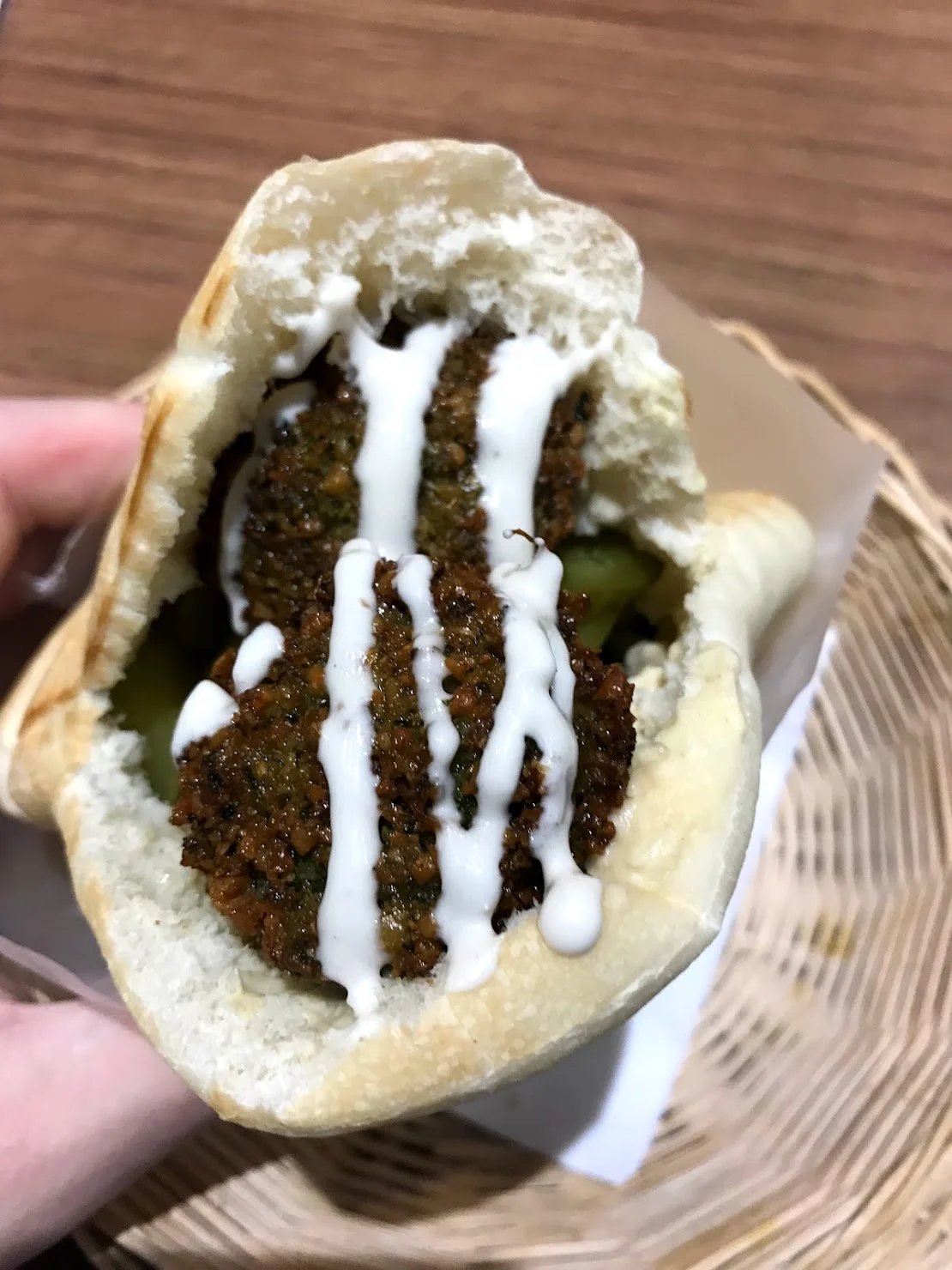
Haifa
Taking the crown for Haifa’s best falafel is the, almost legendary, HaZkenim Falafel. A small hole in the wall, this is Israeli-style falafel as it should be.
3. Sabich
Every friend which visits Israel has the same reaction. Sabich is the Israeli street food you may overlook at first, but its often the one you fall hardest for. And for me, well it’s my absolute favorite.
Sabich is an Iraqi-Jewish concoction. Historically, Iraqi Jews ate pre-made fried eggplant for breakfast on the Shabbat (due to prohibitions on cooking). Upon their arrival in Israel, the sabich sandwich was born. A soft pita stuffed with fried eggplant, hard-boiled egg, boiled potato, various salads, lots of tahini, parsley, and a generous amount of sour amba. The flavor combination is, quite literally, out of this world: creamy, oily, fresh and slightly tangy.

Best place to try sabich in Israel
Jerusalem
For some reason, sabich tends to be more of a street food phenomena outside of Jerusalem (especially in the greater Tel Aviv region). In saying that, you can still find some high quality sabich here.
In particular, just outside the Agripas Road entrance to Mahane Yehuda Market, Aricha Sabich is my Jerusalem go-to for sabich. With a slight hipster aesthetic, they have one or two tables – otherwise you’ll be walking and eating. For a more hole-in-the-wall Israeli street food experience, head to Hasabichya on Shamai Street.
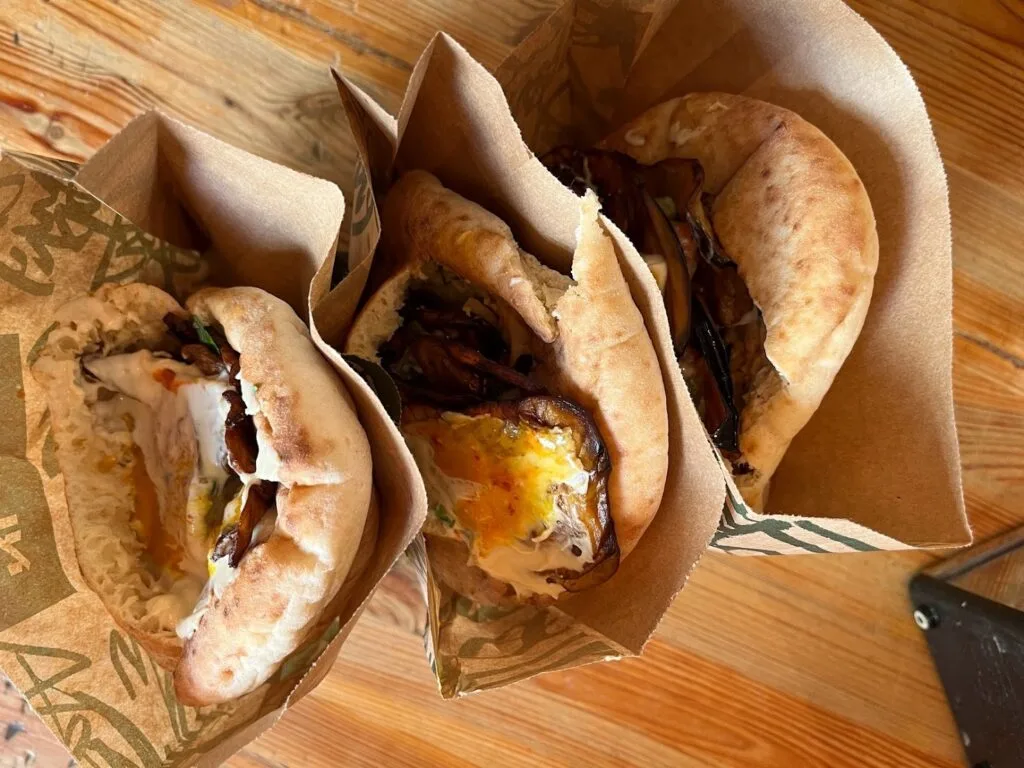
Tel Aviv
Where to begin for my favorite sabich in Tel Aviv?
It would be blasphemy to have this conversation without paying homage to the legendary Sabich Tchernikhovsky, just a few steps from the Carmel Market (and one of our favorite restaurants in the area). Otherwise, Sabich Frishman retains an almost mythic aura around it – despite having sold out a few years ago and creating a literal sabich empire across Tel Aviv.
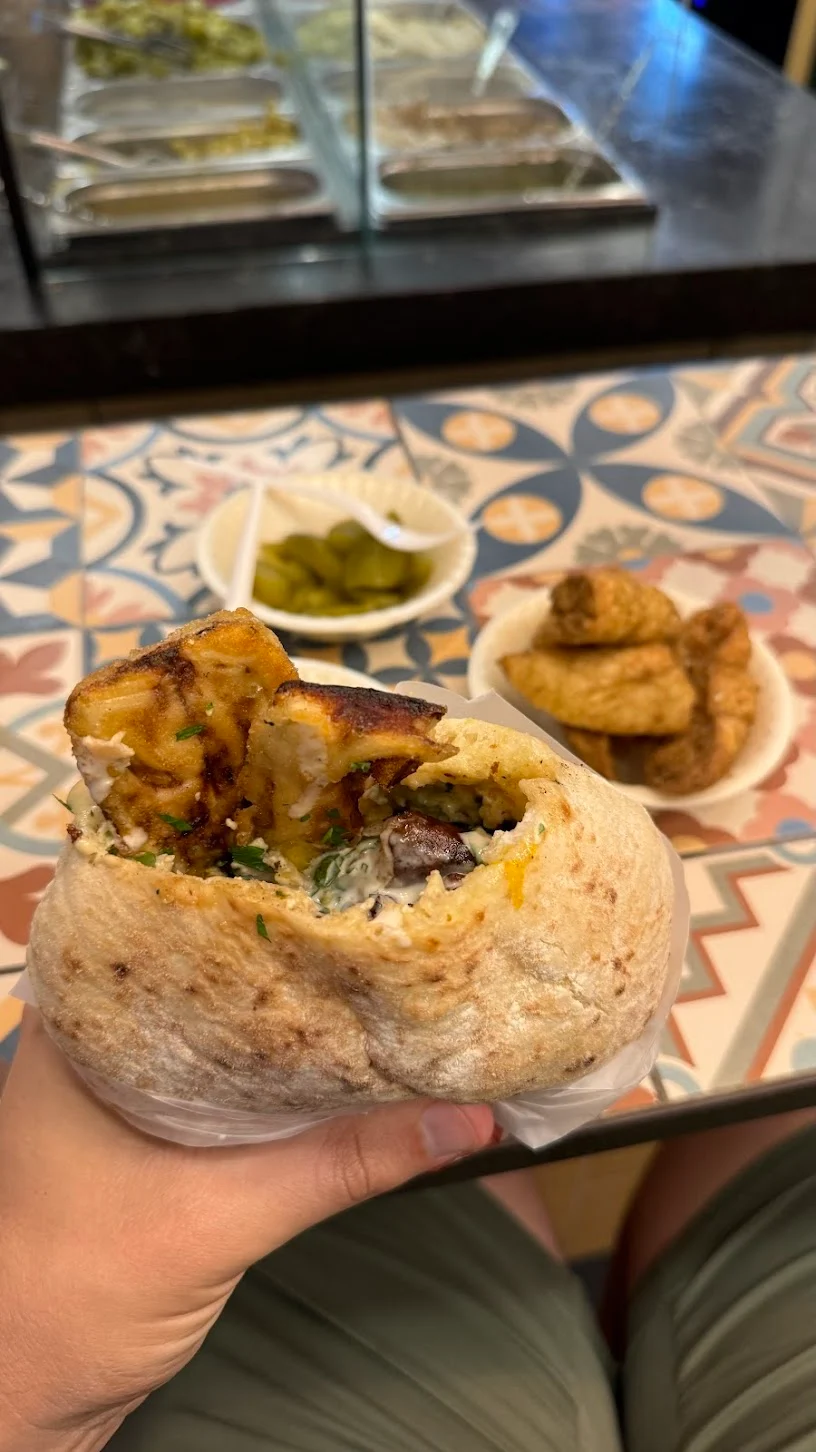
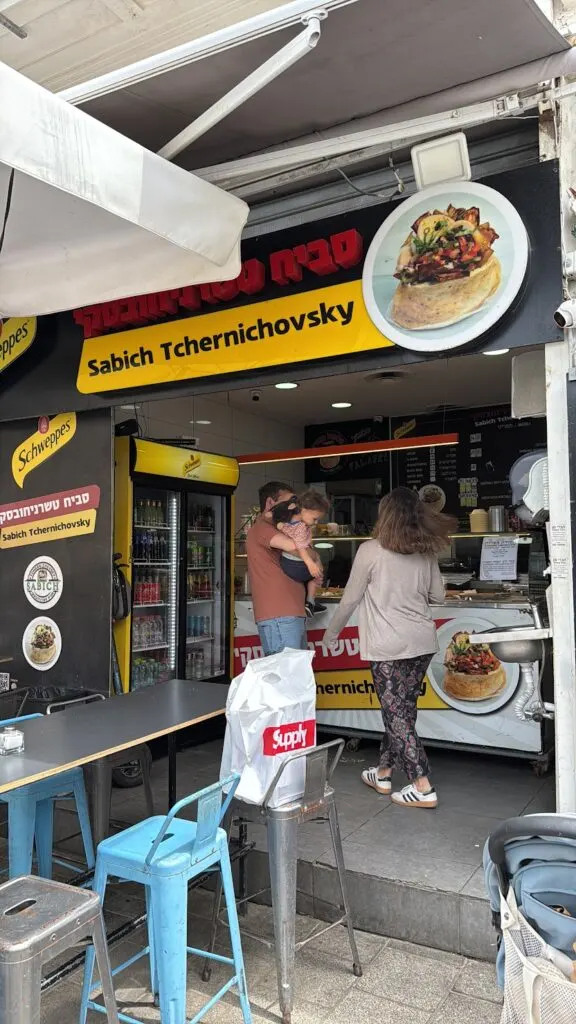
A little further north, I really love the sabich at Falafel Gabay. Rather than boiled potato, Gabay add in a few tater tots. Who doesn’t love some innovation?
4. Jachnun
It’s time to talk about Yemenite food. You’re probably thinking, but I’m looking for Israeli street food. Following the mass exodus of Yemen’s Jews, the Yemenite Jewish foods found on this list can only be found in Israel. That’s right, these dishes literally cannot be in found in Yemen itself.
Like much of Jewish cuisine, Jachnun is one of those dishes which probably doesn’t make sense until you try it. The prohibition of cooking on the Sabbath led to the creation of a number of unique Jewish dishes which were either pre-cooked, or slow cooked over 24 hours. Jachnun is one of those dishes.
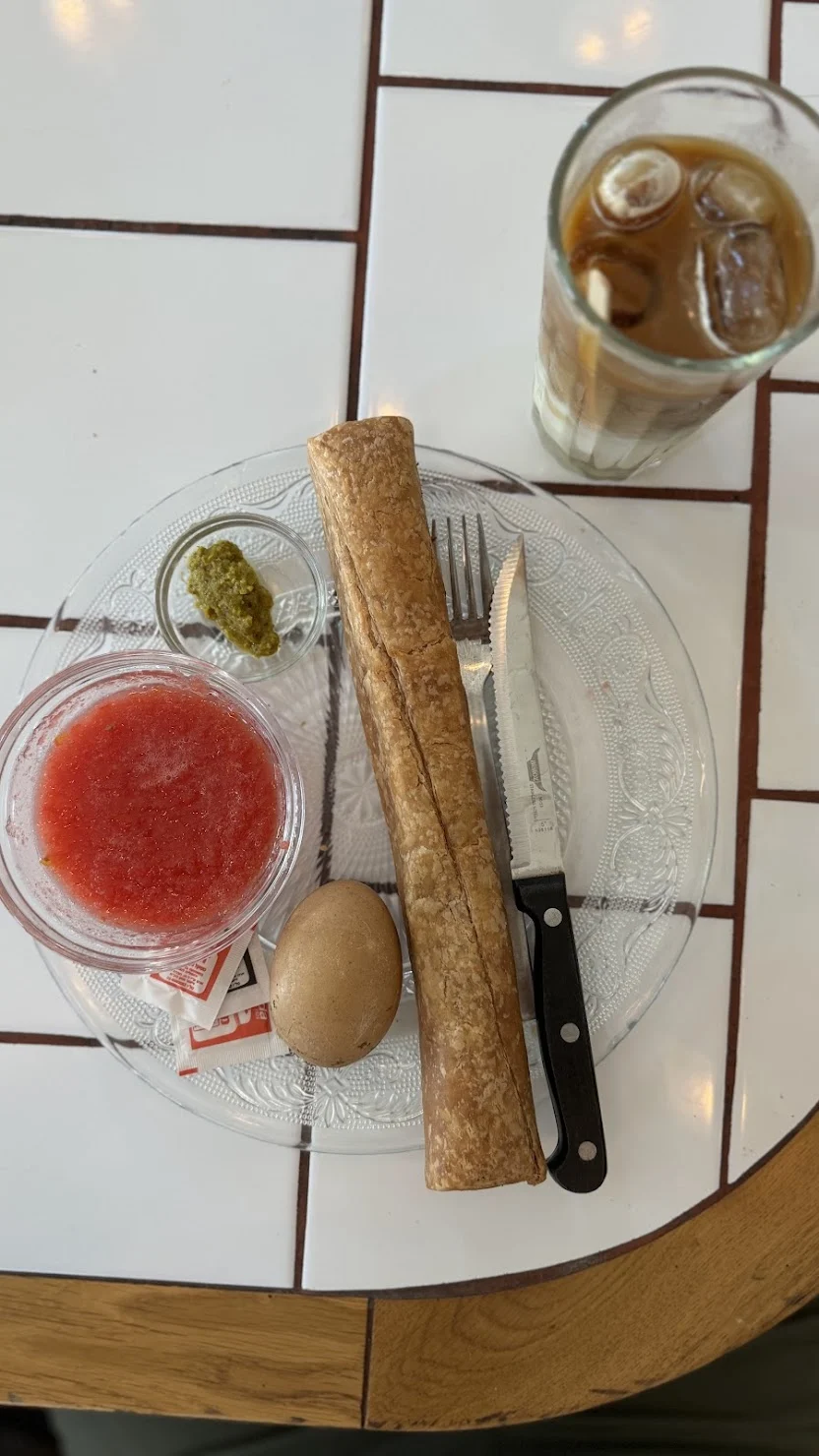
Imagine a tightly rolled, layered oily dough, slow-baked overnight in a low oven until it turns a dark brown and is essentially caramelised in its own oil. It’s almost like a slow-cooked croissant, albeit a little bit more savory. Served alongside a hard-boiled egg and some grated fresh tomato sauce, Jachnun is the ultimate Israeli street food.
The catch? Most places will only sell Jachnun on Fridays and Saturdays.
Best place to try jachnun in Israel
Jerusalem
Jachnun on Friday mornings isn’t as popular in Jerusalem. In saying that, the extremely popular JahnunBar in Mahane Yehuda Market offers a more fusion-style jachnun wrap every day of the week.
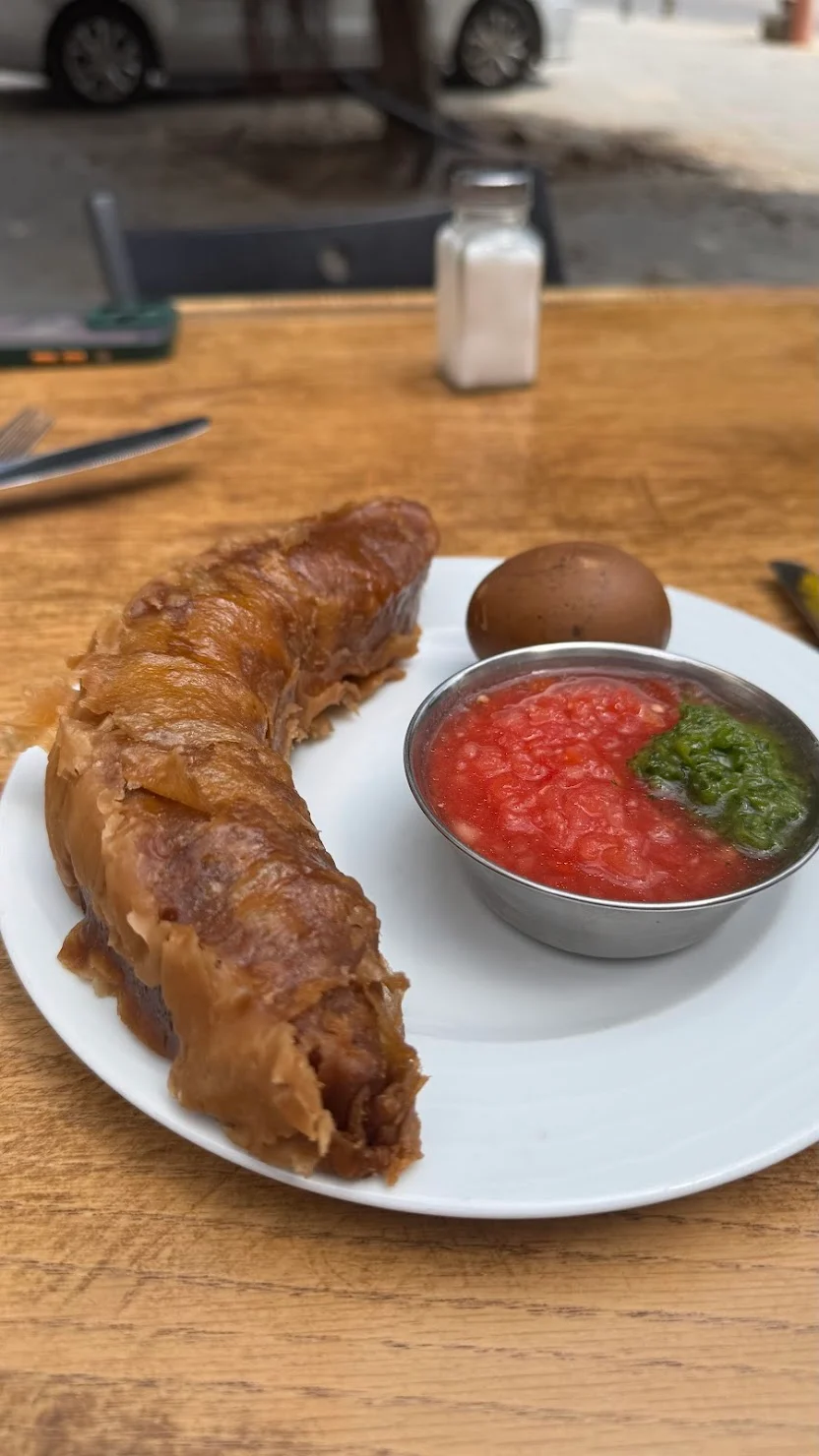
Tel Aviv
Walk around Tel Aviv on a Friday or Saturday and you will see people sitting at cafes usually with a plate of jachnun in front of them. For a traditional-style jachnun, I’d recommend heading toward a dedicated jachnun establishment like Noam’leh or Jachnun Mul Hayam.
In saying that, my absolute favorite jachnun would be at Bucke Cafe (again, only on weekends). Beside being my favorite breakfast cafe in Tel Aviv, Bucke Cafe’s jachnun platter lifts this basic dish up a notch with an elaborate tahini and fresh tomato spread.
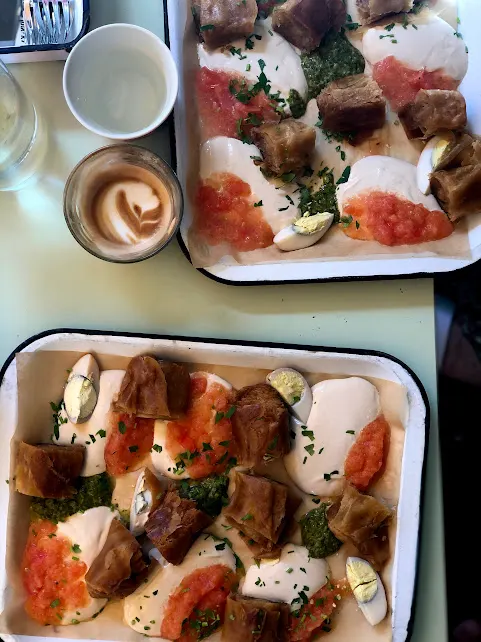
If you’re looking for jachnun during the week, I’d always recommend Saluf & Sons, one of my favorite Yemenite restaurants in the ever-gentrifying Florentin neighborhood.
5. Kubaneh
Kubaneh is another Yemenite bready masterpiece. This pull-apart bread is buttery, pillowy and impossibly good. Think of it as a slightly punchier brioche, slow-cooked until the crust darkens and the inside turns a little stretchy.
Also traditionally served for Shabbat breakfast, kubaneh has recently made a move on the Israeli street food scene. You’ll usually find it served with a spicy zhug or creamy labneh. Better not to think about the calories.
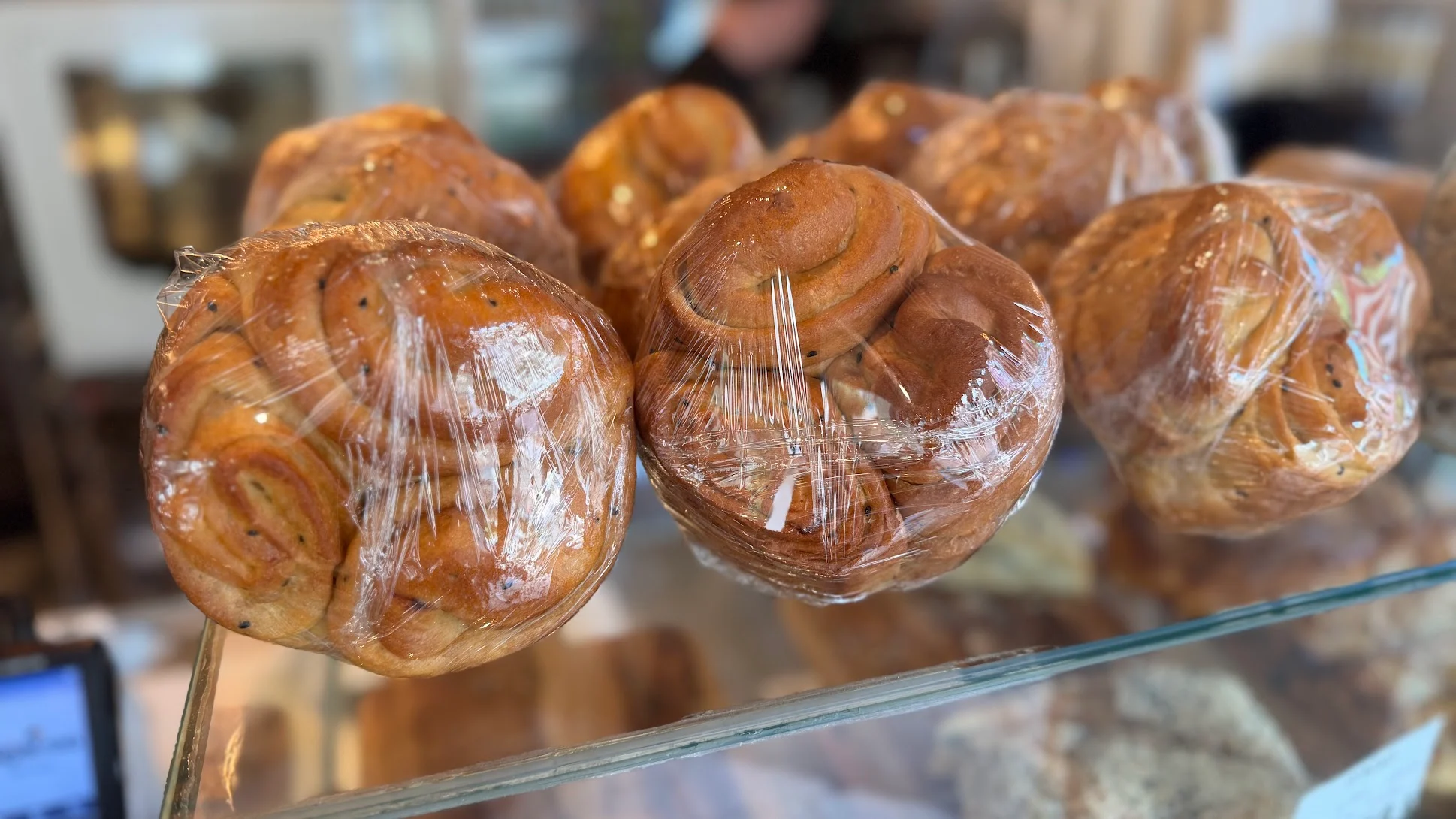
Best place to try kubaneh in Israel
Jerusalem
Joni&kubane is a new Kubaneh joint in Jerusalem’s Mahane Yehuda Market which is receiving rave reviews from Jerusalem foodies.
Tel Aviv
Muma’s Kubaneh (הקובנה של מסעדת מומה) is a small, weekend-only kubaneh cafe. These guys are experts and worth making some time to visit. Otherwise, the jachnun restaurant Noam’leh usually has a few kubaneh for sale by the counter.
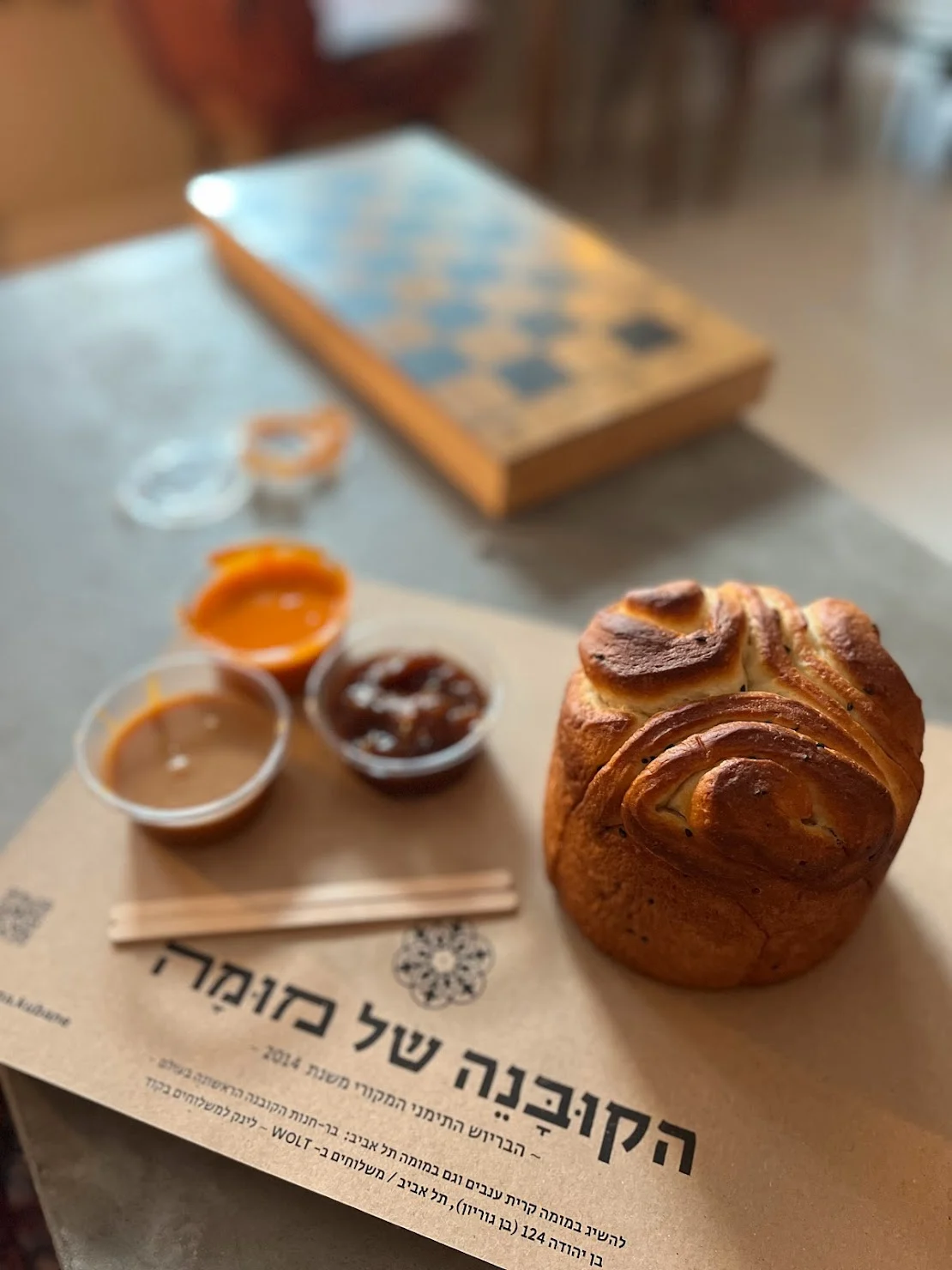
6. Malawach
Few dishes stir up nostalgia like malawach. As a kid, if I was well-behaved, my mother would pop a malawach in the pan as a special treat.
Malawach is usually the traveler’s favorite of the Yemenite Jewish bread trio. Flaky like puff pastry, flat like a pancake, and usually pan-fried in just enough oil to feel slightly naughty. Malawach is each in a million ways. You can tear it into pieces and dip in sauces, roll it up with eggs and grated tomato or layer it like a wrap with your favorite fillings.
This is unquestionably the most popular Yemenite Jewish street food you can find in Israel. Some places have gone trendy fusion style, others serve it like a Yemenite burrito. In my opinion, the only way to find out your preferred style is to try them all.
Best place to try malawach in Israel
Jerusalem
Much like their jachnun offering, the JahnunBar in Mahane Yehuda Market offers a trendy, fusion-style malawach with your choice of fillings. For a more traditional Yemenite experience, head to Bab al-Yemen in the Rehavia neighborhood.
Tel Aviv
For the best malawach in Tel Aviv, make your way to המגולגלוואח (HaMagulgalawach), a small stall in the Carmel Market. The owner is quite the character and will usually be singing and dancing the latest Israeli pop songs as he prepares your malawach. And don’t worry about the messy counter, the food here is as fresh as can be.
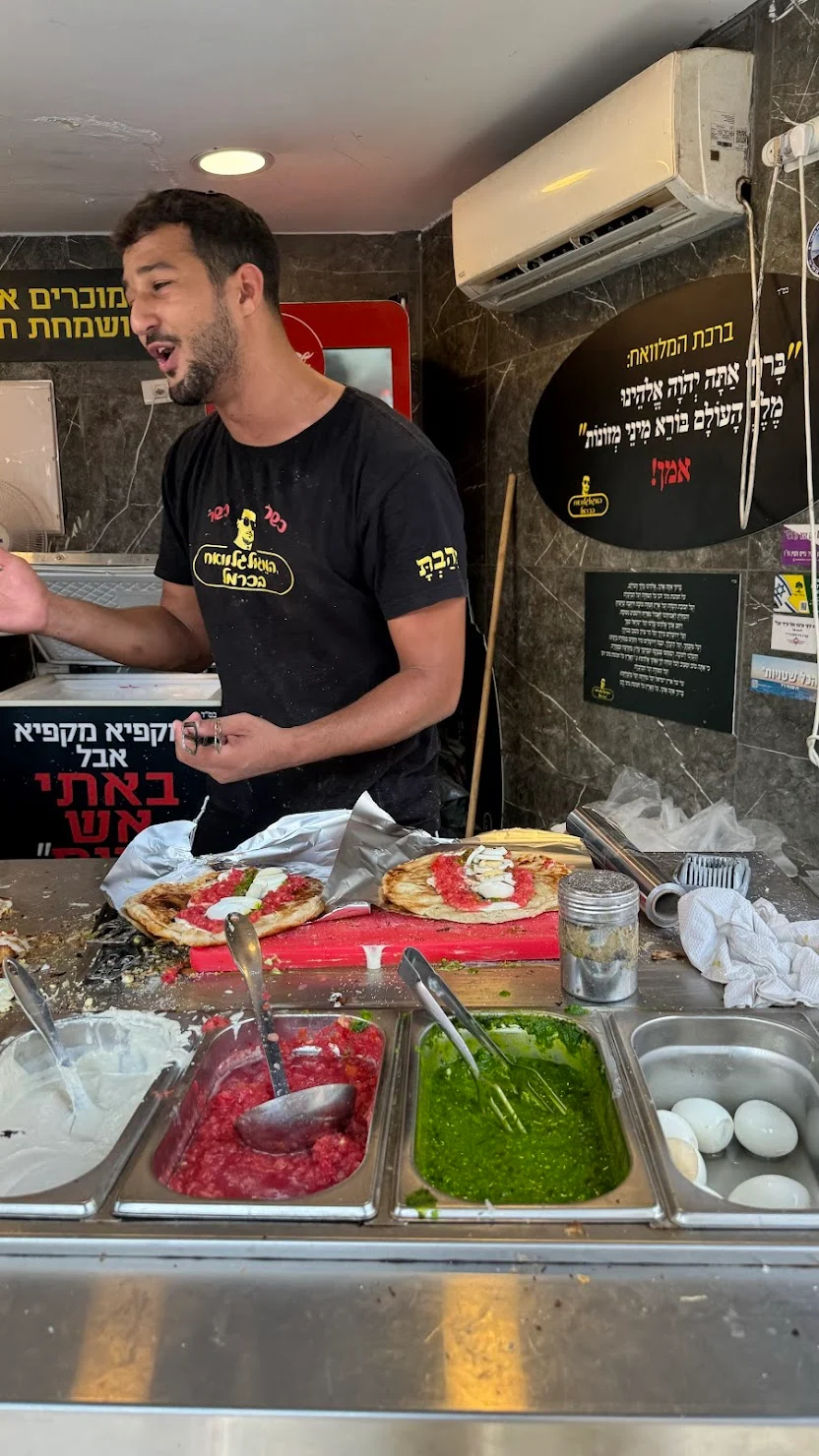
For more of a sit-down vibe, Saluf & Sons should be your go-to for all the Yemenite Jewish deliciousness you need.
7. Hummus
In Israel hummus comes in two forms: (1) as a dip or garnish, slathered into your pita, and (2) as a meal in itself.
I can’t exactly put my finger on it, but Israeli hummus is noticeably different from neighboring countries. While I find Palestinian and Jordanian hummus to be almost silky smooth, Israeli hummus tends to be a little chunkier.
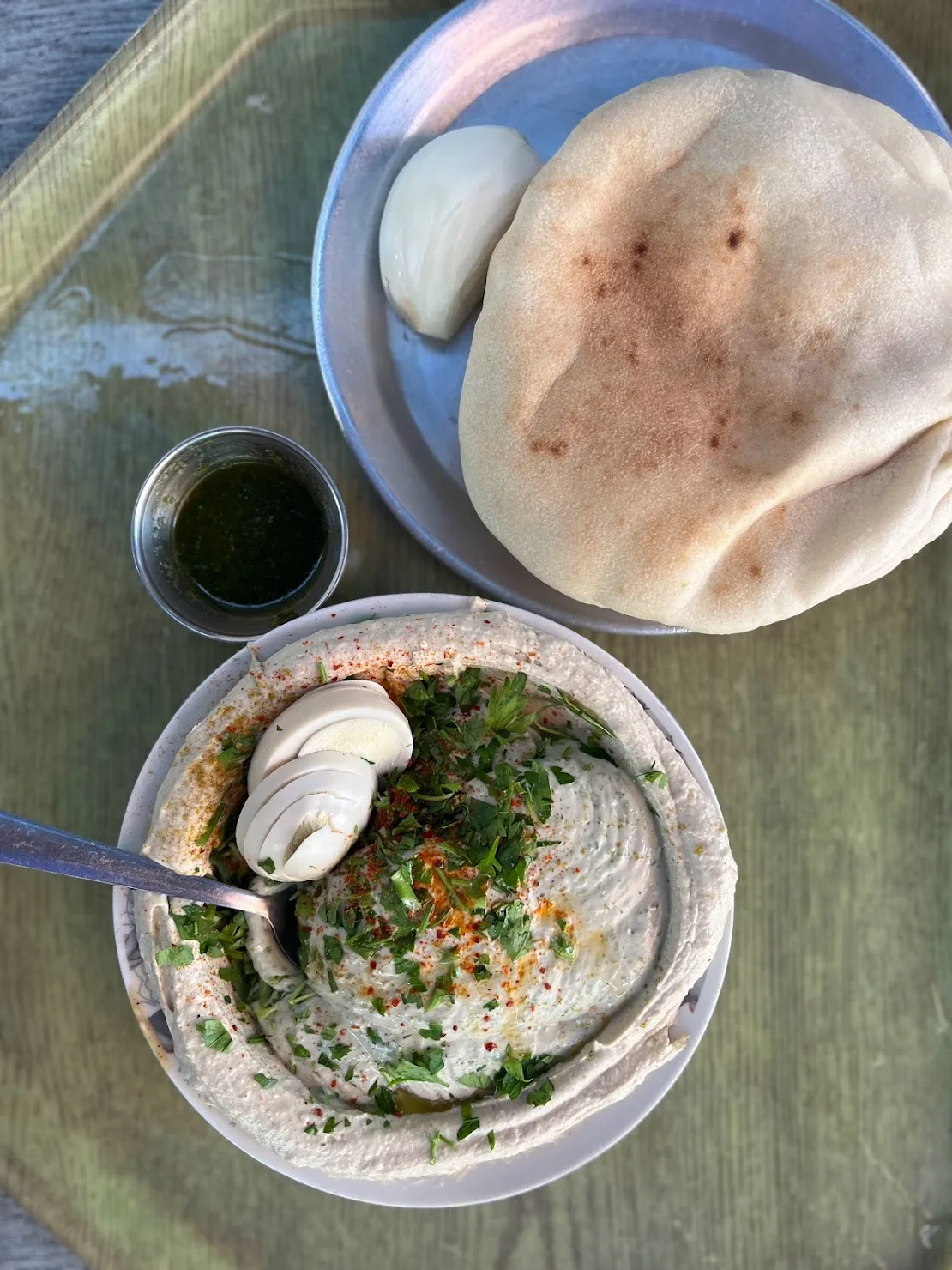
When ordering hummus as a meal (served in a large bowl), its important you choose your toppings correctly. Stewed chickpeas, sautéed mushrooms, spiced minced beef, pine nuts, or even just boiled egg, tahini and chilli. A hummus bowl usually comes with pita, raw onion and pickles.
Best place to try hummus in Israel
Every Israeli will usually have their favorite hummusiya (a dedicated hummus bowl restaurant). I’ll share my favorites, but I’d always recommend asking your Israeli friends for theirs!
Jerusalem
Tahini’s Hummus generally receives rave reviews for their innovative hummus bowls. Think ‘traffic light musabaha’ (green, red and yellow) and the spiced almond hummus bowl. For a more traditional hummusiya experience, make your way to Hummus Eliyahu, a popular chain across Israel with a stall in Mahane Yehuda Market.
Tel Aviv
My two favorite hummusiyas in Tel Aviv are only about a 2 minute walk apart. This means if one is full, you always have a back up. My first pick is always Shlomo & Doron Hummus, followed closely by Hummus Asi and Adnan. Both are located in the foodie paradise of the Carmel Market.
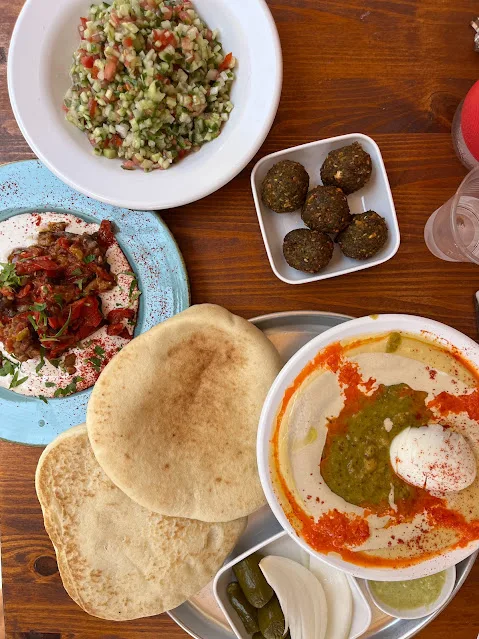
For a more Palestinian-style hummus experience, I can’t not mention the Jaffa favorite, Abu Hassan.
8. Bourekas
If I had to declare my weakness on this earth, it would be bourekas.
Right across the former Ottoman Empire you’ll find some form of the Turkish börek. Brought to Israel by Sephardic Jews in the early 1800s, bourekas might just be the most popular Israeli street food (after falafel).
Every country does this stuffed puff pastry a little different. In Israel, you can usually find a similar assortment of fillings to choose from (each coming in a distinct, yet somehow nationally uniform, shape). Take your pick from potato, savory cheese, Bulgarian cheese, sweet cheese, spinach, mushroom, and ‘pizza’. If you’re at a dedicated boureka joint, it will usually come with a boiled egg and pickle.
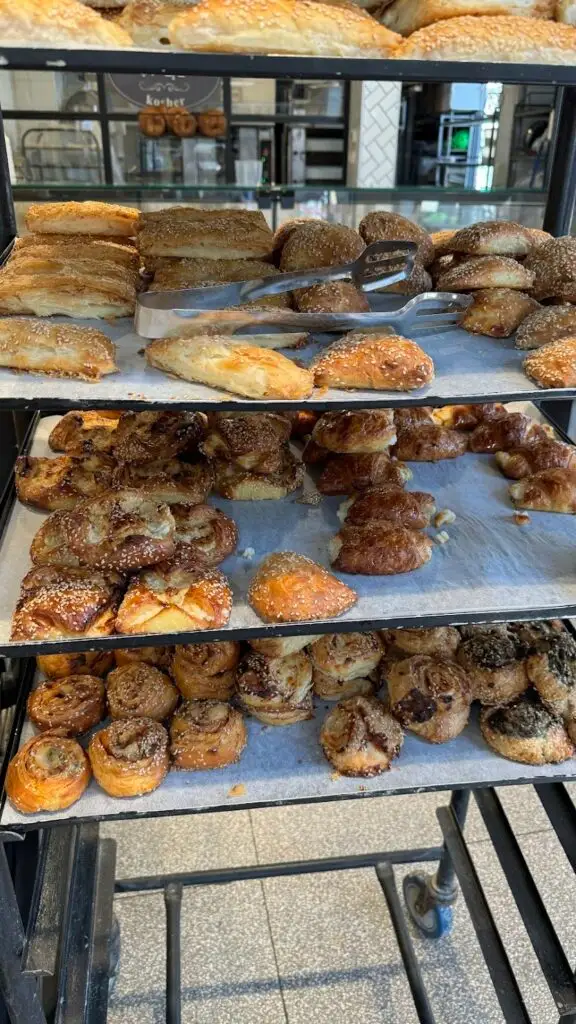
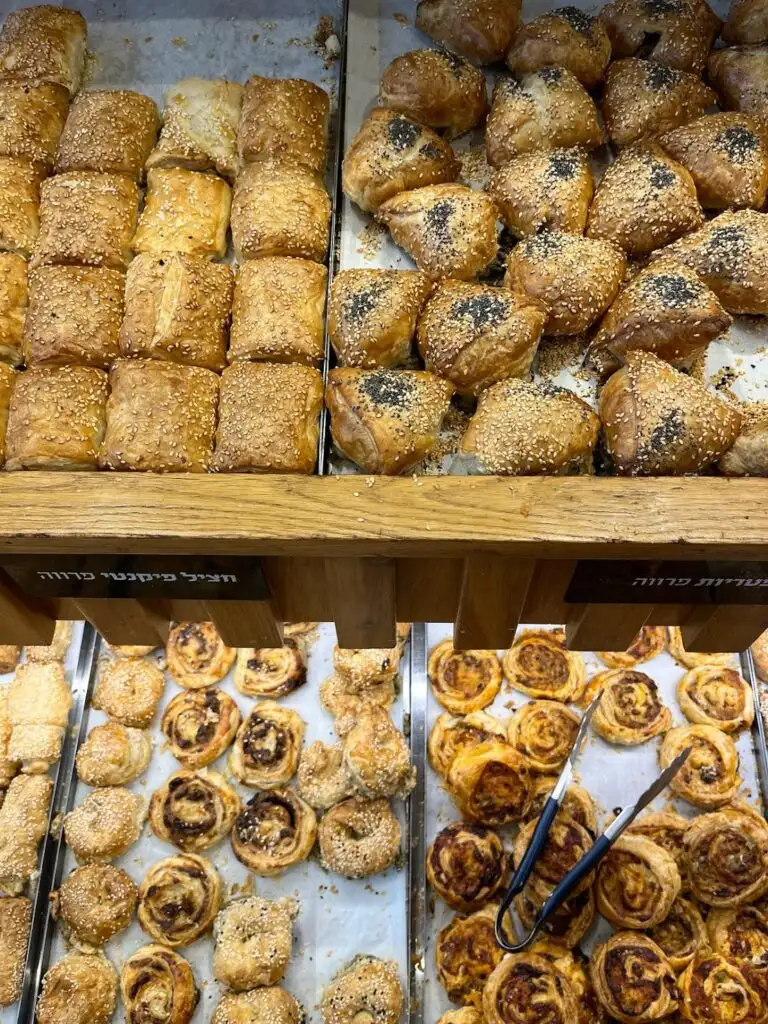
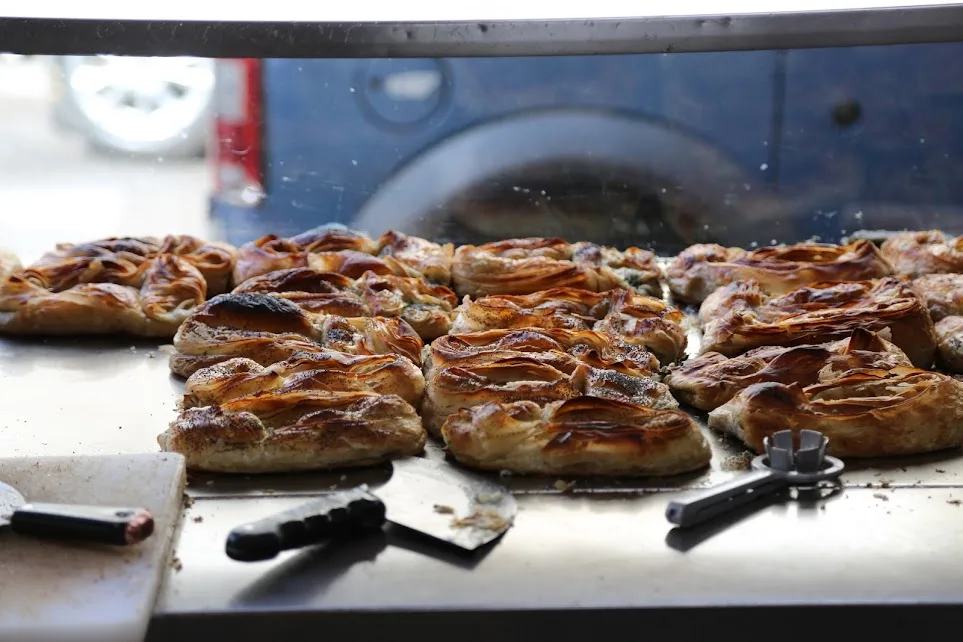
Best place to try bourekas in Israel
You’ll have no trouble finding bourekas in Israel. They’re sold at pretty much every bakery, corner shop, kiosk and most gas stations. You’ll want to make sure they’re fresh, and preferably a little flakey.
Among the national bakery chains, I think Ne’eman Bakery (מאפה נאמן) do them best. You can easily find Ne’eman all across the country.
Jerusalem
For something a little extra, make your way to Burekas Musa, a small shopfront which has been selling bourekas on busy Jaffa Street since 1959. Here, Musa will not simply give you one of the best cheese bourekas of your life, but he will quickly cut the boureka in half and stuff it with hard boiled eggs and fresh tahini.
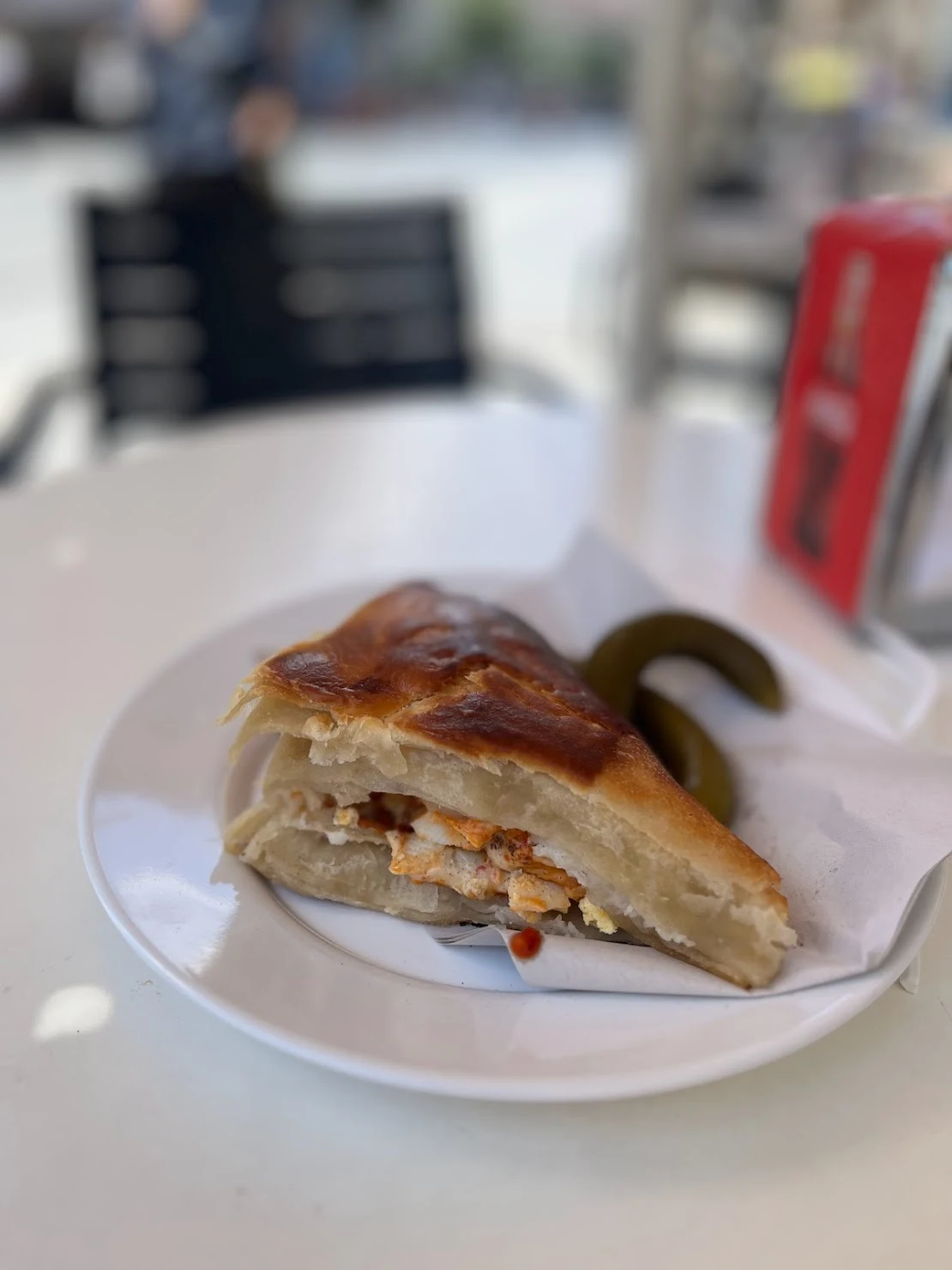
Tel Aviv
In Tel Aviv there really isn’t much competition for the best boureka in town: The Bourekas of Mother Levinsky (הבורקס של אמא לוינסקי). A small shopfront in Florentin’s Levinsky Market, this place offers huge bourekas (it’s a full meal). As a self-declared boureka connoisseur, I can tell you this place has somehow perfected the heavy filling/flakey pastry combination. Expect long lines on the weekend.

For a more upmarket boureka experience, don’t miss the ‘boureka platter’ at Bucke Cafe. Here, your refined spinach and ricotta boureka is combined with salads, fresh eggs, tahini and goats cheese for the ultimate Tel Aviv breakfast.
9. Yerushalmi Kugel
If you’re familiar with Jewish cuisine, kugel will come as no surprise. Large, savory cake-like dishes which are traditionally made from potato, or the sweeter (yet still savory) version made from noodles.
However, did you know that Jerusalem is home to a unique type of kugel? Yerushalmi kugel (literally: Jerusalem kugel) is a uniquely Jerusalem concoction, created by Hungarian Jews in Jerusalem in the 1700s. I don’t even know how to describe this dish, but let me give it a try. Noodles, caramelised in thick oil and lots of black pepper. It’s usually slow cooked and forms a thick, extremely dense cake. The flavors are complex, completely unexpected and uniquely Jerusalem. One shop-vendor once told me ‘a good Yerushalmi kugel bites back‘.
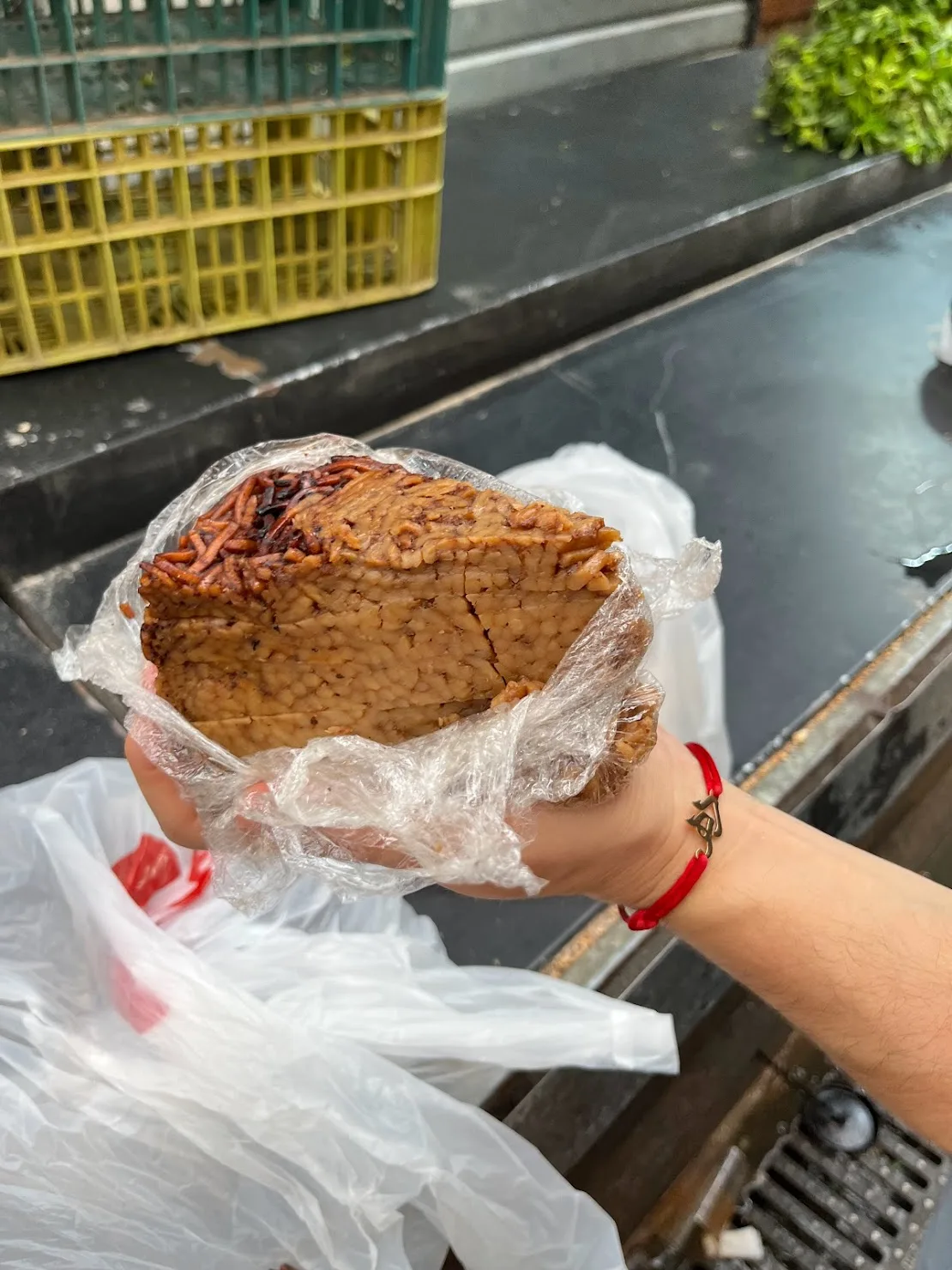
Best place to try Yerushalmi kugel in Jerusalem
You’ll usually only find Yerushalmi kugel for sale on Fridays, as the dish is traditionally eaten on Shabbat. While you can find it around Israel, let’s be honest: you want to be eating it in Jerusalem.
I can’t pinpoint one particular seller of Yerushalmi kugel. Rather, I recommend braving the chaos of Mahane Yehuda Market on a Friday morning. As you glide through the alleyways, keep your eyes open for plastic-wrapped pieces of dark brown kugel. Usually, the bakeries and deli-style stalls will be selling a limited amount.
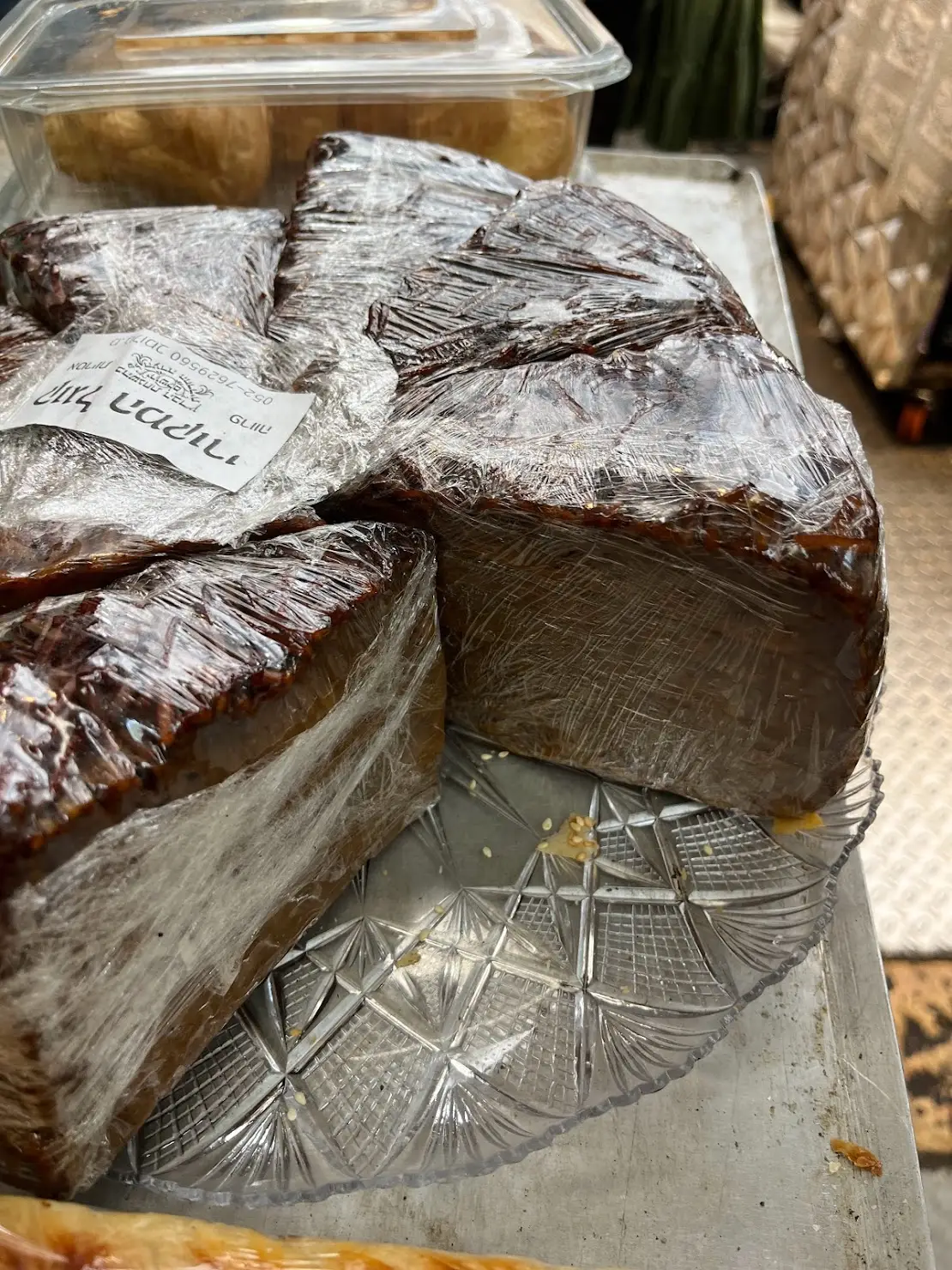
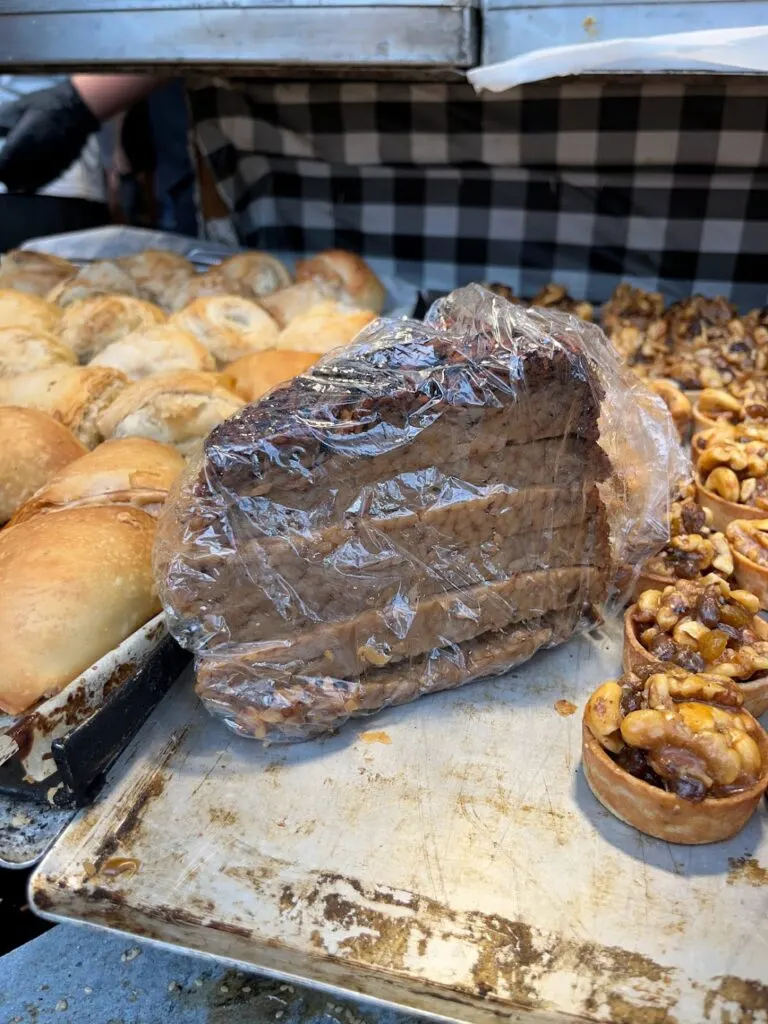
10. Druze pita
The Druze people are a close-knit ethno-religious minority with deep roots in the region. After Syria and Lebanon, Israel is home to the third-largest Druze community in the world. Druze cuisine has contributed heavily to Israeli street food, reflecting the Druze community’s integral role within Israel’s multicultural tapestry.
Among Druze foods, Druze pita (as its colloquially named) has emerged as one of the most popular and, in my opinion, underrated Israeli street food.
Druze pita involves freshly stretched laffa bread, cooked right on a saj – a domed metal grid which chars the bubbling dough in seconds. The result is a smoky, paper-thin flatbread, folded and slathered with rich labneh, zaatar, olive oil, or occasionally spiced meat or cheese. I love Druze pita for being simple, fresh and often the perfect tie-me-over before a heavy dinner.

Best place to try Druze pita in Israel
The Druze population is primarily concentrated in the north of Israel. This means up in the Carmel Mountains or along the Galilee, you’ll find roadside stands or market stalls run by Druze families. These stalls will often sell fresh bottles of olive oil and preserved labneh balls too.
Tel Aviv
In the heart of Tel Aviv’s Carmel Market, you’ll often find a small stall making fresh Druze pita almost immediately outside HaBasta (one of our favorite restaurants). You’ll often find me there, too.
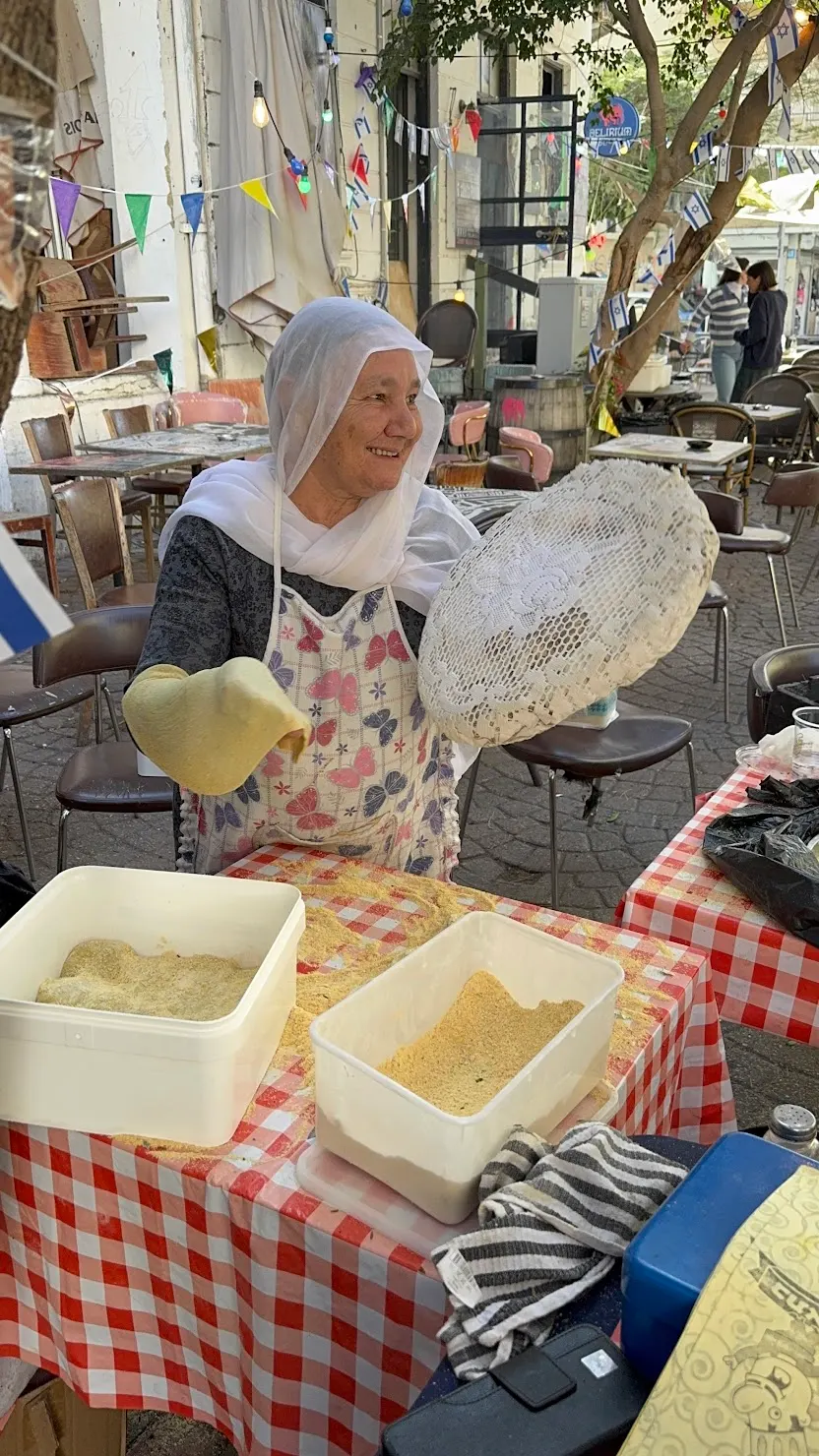
Haifa
It might be a little out of the centre, but everyone swears by the Carmel Druze Pita stall right outside the entrance to Haifa University.
A little further down the road is the popular Druze village of Daliyat el-Carmel, where you can find formal sit-down restaurants serving Druze cuisine. My favorite here has to be Nora’s – which might be the only Kosher Druze restaurant in the world.
12. Challah Schnitzel Sandwich
The challah schnitzel sandwich represents how Israel’s talent for culinary fusion is firmly rooted in the country’s history. Take a European-style schnitzel, brought to Israel by Ashkenazi Jewish immigrants. Next, sandwich this schnitzel in the soft, brioche-like Jewish staple, challah bread. Then elevate the sandwich with a whole array of Middle Eastern Jewish condiments: tahini, matbucha, green zhug, amba and more.
Like many of Israel’s great street foods, challah schnitzel sandwich began appearing in markets in the 1970s, as second and third generation Israelis began fusing the recipes of their grandparents with those of their friends. In turn, this uniquely Israeli sandwich emerged and took its rightful place in the canon of Israeli street food.
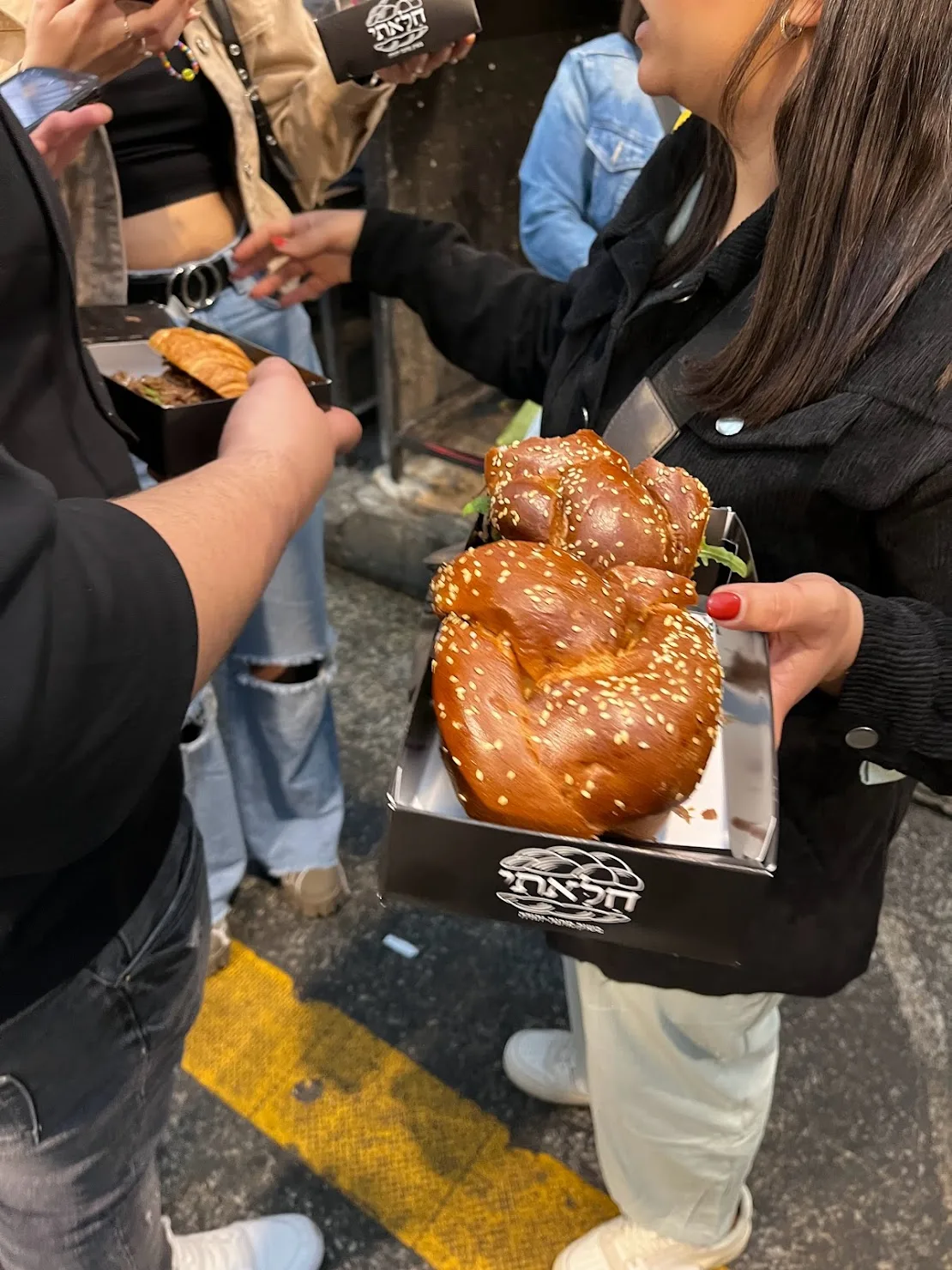
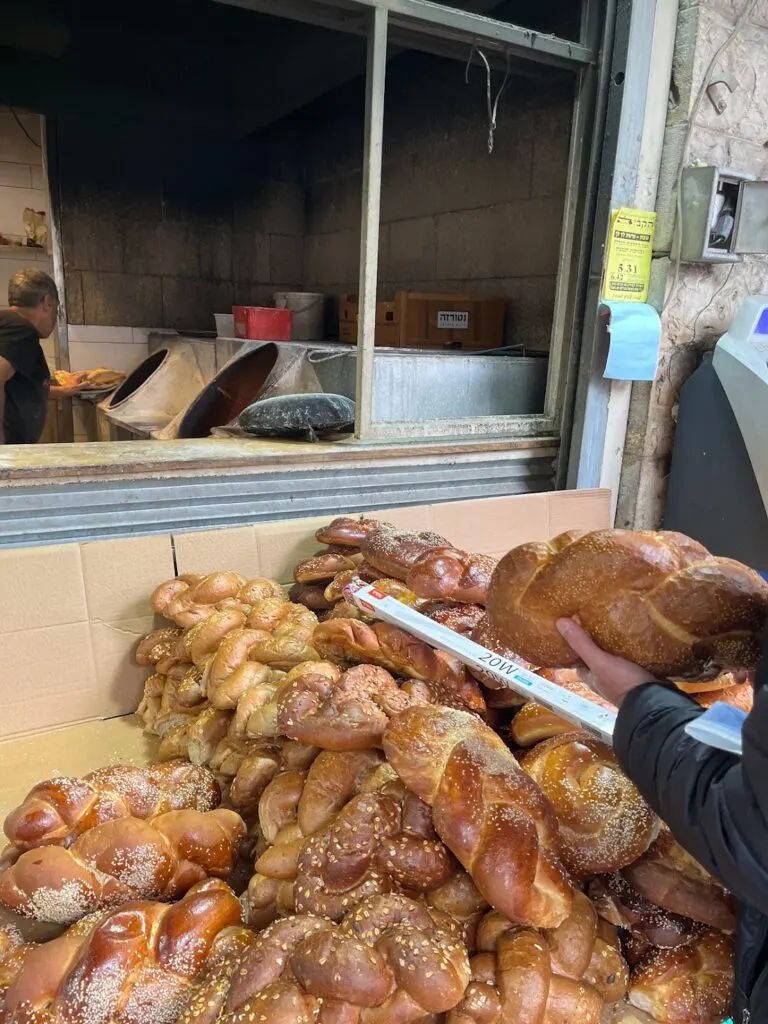
I warn you: challah schnitzel sandwich can get messy. As you pick up your market sandwich, you’ll want to quickly find somewhere safe to eat (without staining your shirt).
Best place to try challah schnitzel sandwich in Israel
Jerusalem
You’ll spot the line before you spot the stall. Deep inside Mahane Yehuda Market is Halati, the ultimate Jerusalem challah schnitzel sandwich experience (albeit a little greasy).
Tel Aviv
It comes as no surprise that the Carmel Market is the place to be. Ishtabach is easily the best challah schnitzel sandwich in Tel Aviv (its the layered eggplants which makes the difference).
Elsewhere, in the heart of Tel Aviv’s Allenby Street, Challah is a new addition to the challah schnitzel sandwich competition. While towards the Sarona Market, Nurman remains a crowd favorite (featuring with lots of seating).
13. Gazoz
Gazoz traces its roots to the 1920s when Jewish immigrants brought the concept of flavored soda to the streets of pre-independence Israel. Originally a simple combination of soda water and fruit syrup served from pushcarts, gazoz quickly became Israel’s most beloved drink.
Today’s gazoz is less about a ‘cheap drink in the sun’. This once working-class refreshment has undergone a remarkable transformation. Across cafes and bars, Israeli beverage artisans are elevating this humble bubbly drink into botanical artwork in a cup. House-fermented fruits, fresh herbs from rooftop gardens, and handcrafted syrups combine with sparkling water to create drinks which cater to Israel’s Instagram avant-garde. A transformation which reflects modern Israel itself: rooted in tradition yet boldly innovative.

Best place to try gazoz in Tel Aviv
In recent years I’ve only seen gazoz on the streets of Tel Aviv. Unquestionably, the ultimate gazoz experience is at Florentin’s Cafe Levinsky. A small hole-in-the-wall counter, you won’t find a menu here. Rather, the staff will arrange something for you, and I’d encourage you to go along for the ride. Each gazoz sold here is completely unique. Fermented peaches, homemade cherry cordials and fresh basil, you name it.
Local tip: Café Levinsky will refill your gazoz as many times as you’d like. Pick up a gazoz, and take a walk through Levinsky before making your way back for a refill!
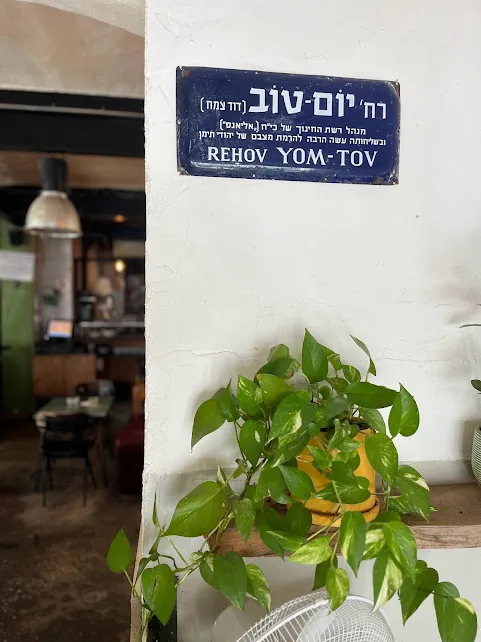

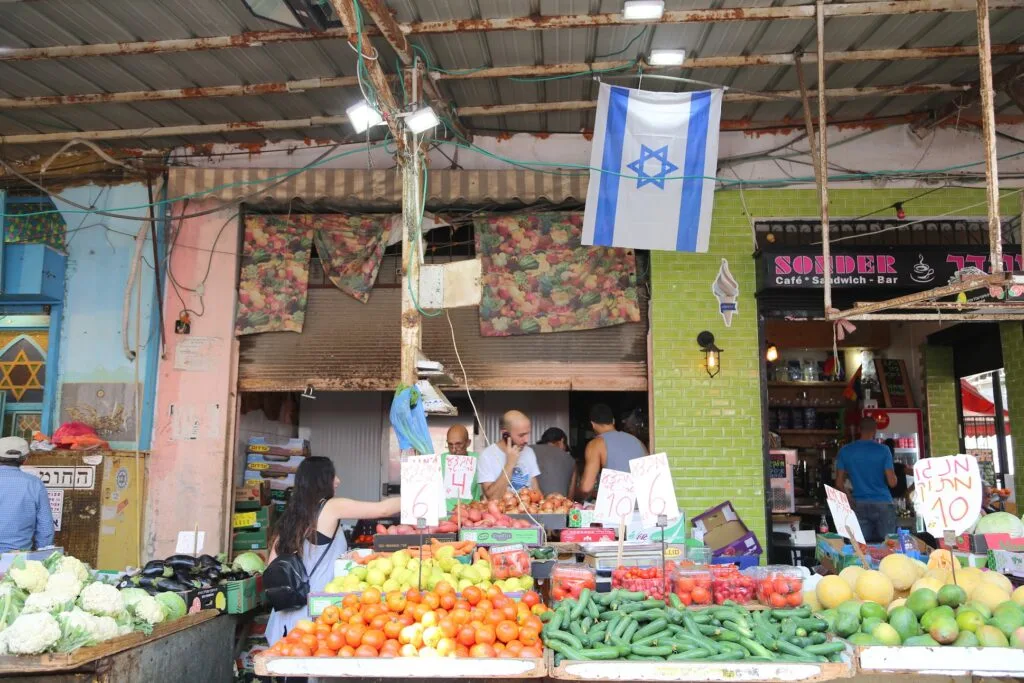
Share This Article

Traveling soon? Subscribe to The Insight below and get exclusive access to our personalized travel advice community via WhatsApp so you can ask all your burning travel questions.
Looking for the best comprehensive travel insurance? SafetyWing has you covered.
And for your eSIM in every country, there is only one option we recommend: Airalo.
Read more of our best insights from around the world


